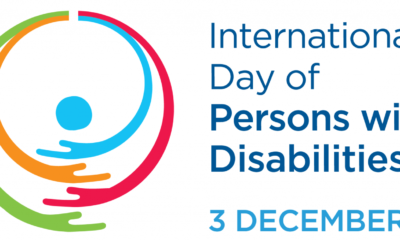Features
Love without Boundaries with Bukola Ayinde: Homeschooling Your Special Needs Child
 Homeschooling or home education can be defined as the education of children outside a school setting. This simply means that a child does not attend a regular school, but a parent or teacher teaches the child at home. In the case of a family with a special needs child, this means that the child is not attending a special school or a mainstream school. Rather, the child is being taught either by a teacher or the parent.
Homeschooling or home education can be defined as the education of children outside a school setting. This simply means that a child does not attend a regular school, but a parent or teacher teaches the child at home. In the case of a family with a special needs child, this means that the child is not attending a special school or a mainstream school. Rather, the child is being taught either by a teacher or the parent.
In my opinion, which is in line with Alliance for Inclusive Education UK, the best schooling environment for a special needs child is in the mainstream setting. However, there are instances where this may not be possible or where the child’s potentials are not fully harnessed in the mainstream school that is available.
Reasons for homeschooling a child may include:
Funding: If parents are unable to pay the fees of a private mainstream school or a special school, then they may decide to homeschool the special needs child. Funding may also include the cost of transportation. If a child has a movement disorder and a big stature, or the child is approaching the preteen or teenage years, then it may be difficult for that child to take public transportation to school. Public transportation in Nigeria is not disability-friendly and it is quite expensive to use taxis on a daily basis, even for average income earners.
Another reason for homeschooling a special needs child is if it becomes obvious that the child is not benefiting from the school he or she is attending. It may be that the school the child attends pays lip service to inclusive education. This means that though children with special needs are admitted, the school has no constructive plan to include them in regular school activities or the teachers are not adequately trained to facilitate learning for the children.
Another reason for homeschooling a special needs child could be that the parents cannot find a school in the neighbourhood that is willing to admit the child.
If a special needs child has other complicated medical conditions that affect him or her, then the parents may consider homeschooling. An example is a child who suffers from seizures, a child who is constantly on oxygen machine or a child who feeds through a tube attached to the stomach region. In developed countries, children in this category still go to school; in fact, some go to mainstream schools. However, in Nigeria, these types of medical conditions might hinder a special needs child from getting admission into a good school of his or her choice so homeschooling the child may be the only option.
These are not the only reasons why special needs children are homeschooled.
Early this year, I met a woman whose son was diagnosed with cerebral palsy at about two years old, but when I met the boy at the age of eight, he had serious behavioural disorder. When I spoke with the mother about the boy, she said he had been attending an inclusive primary school. However, he was kept in a separate class with two other boys who had autism and that was where he received most of his tuition. This is a boy who cannot take instructions and makes a lot of noise that can distract other kids. How can such a boy be placed in a class with other children? That will certainly be unfair to the children. It was obvious that the parents and the school did not get things right from the beginning.
I advised the mother to withdraw the boy from the mainstream school and not seek to put him in another mainstream school for a while. I was certain that no mainstream school will allow the boy to stay in the same class with other regular students.
Inclusive education happens when children with disabilities and others without disabilities participate and learn together in the same classes. However, the truth about inclusive education is that the child needs to be given an appropriate diagnosis at an early age, as well as an effective rehabilitation plan. This will also work hand in hand with the appropriate support in school to make inclusive education effective.
Inclusive education is not magic. It is the combination of hard work, patience, consistency by the parents of the child, the school and its teachers as well as the child’s therapy team.
I told the mother of the boy to enroll him in a private special needs school for children with autism but the woman complained about the exorbitant fees of the school. The other alternative is to employ a behavioural therapist to work with the child at home. The child needed to calm down and learn how to take instructions. A one-on-one approach was the best option for him.
In my own case, I withdrew my daughter who was about three years old and living with cerebral palsy, from the mainstream school she was attending. She had been assaulted by her physiotherapist and I was scared of letting her out of my sight. I did not have any problem with her school, but I wanted to keep a closer watch on her. At that time, she was completely non-verbal and that meant she was unable to tell me if someone tried to hurt her.
In handling her homeschooling, the first thing I did was to ask my friends who had children her age, what their children were learning in school. As at then, my daughter was supposed to be in toddlers class, going to nursery one. I drew up a timetable which consisted of her physical therapy, speech therapy, occupational therapy as well as a time to learn phonics, alphabets, numbers, shapes and colours. She also used flashcards, pop-up storybooks, musical instruments and toys to enhance her hand functions. My husband and I employed a school teacher who came to teach her three times a week. We also employed an assistant teacher who stayed with her from morning until evening during the week. Her therapies which included physiotherapy, occupational therapy and speech therapy were also conducted at home.
My daughter had a daily routine then. I woke her up at 6a.m as if she was going to a regular school. Then she would be given a bath and breakfast. Thereafter, she would be assisted to walk around the compound of the house. I allocated a small portion of the flowerbed in the compound to her so she could grow a plant. Her nanny assisted her and they grew corn. The whole idea was for her to carry a small plastic watering can so that she could water the plant and also remove the weeds. She could not do these things by herself but with the appropriate assistance, it was achievable.
Exposing a child to early morning sun which is rich in Vitamin D is one of the benefits of walking outside the house. The child will also breathe in fresh air. Walking also helps the blood in the body to circulate better and it is very beneficial to the joints and muscles. It is important to reiterate that my daughter is unable to walk by herself, so her caregiver supports her with a walker.
After that morning ritual, other activities such as learning her phonetics or numbers as well as her therapies, will kick off.
In order to balance the lack of social interaction with her peers, I ensured that from Monday to Friday, when her sister got back from school, they would visit our neighbours who had children in their age group. My neighbour had a big trampoline and swings for children to play with. They were often joined by children from other homes and all of them would play in my neighbour’s compound for an hour.
One of the benefits of homeschooling for my daughter was that I was also able to monitor her feeding. Previously, I had taken her to a nutritionist because she was underweight. However, after she spent two months at home with proper care, she began to add weight. She was also allowed to take a nap after therapy.
The school teacher working with her gave me a list of age appropriate books to buy. They included books about colours, shapes, birds, animals, fruits, cars and trucks. All these books required her to colour. My husband made photocopies of each page so she could do the same classwork as often as possible. She was colouring and she was learning. Colouring meant she would exercise her arms and fingers.
The assistant teacher that we employed did most of the work. She continued the teaching every day except Sundays. Gradually, everyone realised that Oluwalonimi was trying to talk. All our efforts were yielding fruits.
One of the reasons homeschooling worked for my daughter was because I was staying at home with her. I had made up my mind that it was going to work. I did a lot of research and asked people in the disability management profession a lot of questions. I organised my daughter’s programmes, monitored them and ensured they was working for her.
It is best for parents who want to homeschool their special needs children to carry along the children’s therapists. It is also very important for the parents to carry out their own private research on how best to homeschool their children. Parents, you must be willing to try new things. You may make some mistakes but eventually, you will find out what works best for your children.
Just as inclusive education requires hard work and commitment, homeschooling a special needs child also requires commitment, consistency and passion for it to be successful. It is not what you do when you have the time; it is what you must do to achieve a goal.
Homeschooling my daughter meant I had to suspend every other commitment that I had. A friend of mine who works with children who have disabilities suggested that I take my daughter to a mainstream school at least three times a week. I was very reluctant at first but when my daughter, Oluwalonimi began to cry in the morning whenever she saw her younger sister going to school, I knew it was time to reintroduce her to mainstream school.
I found a school with a small number of students that could cater to her needs and she adapted real quick. She started attending the school three times a week, now she goes there five times a week. My daughter has a caregiver who stays with her in school. She also has her therapies three times a week. I have continued to monitor her food intake and she has continued to gain weight that is appropriate for her age.
Homeschooling has its good points. However, when it is not well managed, it may take a toll on the mental and physical health of the caregivers, as it is quite tasking. Where necessary, it can be done for a certain period of time and the child should be re-introduced to mainstream school or a special school that is appropriate for the child’s needs.
Photo Credit: Dreamstime
***
This post has been edited to avoid any implication that certain disabilities on the spectrum are disorderly.


















